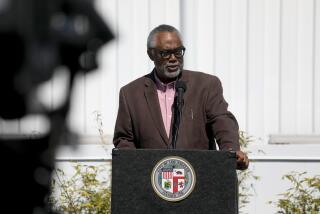The Right Things, for the Right Reasons
- Share via
Just the fact that Chapman University offers a course called the Honors Integrity Seminar is laudable. The only disquieting thought is, what happens to students who don’t pass it?
Anyway, this term, perhaps caught up in millennial and end-of-year-list fever, communications professor Richard Doetkott’s students set out to identify “The Top 10 Acts of Integrity in Orange County in 1999.”
The class arrived at its own working definition of integrity: “Doing the right thing, for the right reason, despite the cost.” They then spent the month of January combing both of Orange County’s major daily newspapers in search of candidates.
Perhaps unwittingly displaying their own integrity, the students wouldn’t pad the list. When they only found six candidates whose stories they could confidently match to their definition, they confined the list to those six.
Doetkott (pronounced like “docket”) says integrity is not an abstract concept to the students. “They yearn for it,” he says. “They want it, they want to talk about it, they want to find it, they want to see it in other people. I think there’s a lot of hunger for it.”
The students didn’t define integrity as perfection of behavior. “You can do something dead wrong and own up to it,” Doetkott says. “That’s part of integrity, too. We assume people are not perfect and that we can only strive. To be a person of integrity, you don’t do just one act. You live your life trying to always do it and to think of it. The important thing is that it is on your mind. When it is not in your mind or your vocabulary, then you’ve already lost it.”
Personal Integrity
Without further ado and in no particular order, these four deeds of personal integrity made the students’ list:
* A 27-year-old man who followed through last July on his plans to marry his high school sweetheart, even after she was so severely injured in a car accident that she spent nine weeks in a coma and another six months undergoing treatment for brain damage.
* A 51-year-old Fullerton man who died of gunshots in September while trying to disarm a crazed gunman at West Anaheim Medical Center. The Chapman students said that while it could be debated whether the man did the “right thing,” considering it cost him his life, his decision was right in that it likely saved the lives of others.
* A mother and daughter decided to drop a lawsuit against the city of Newport Beach following a car accident that nearly killed the daughter. The mother and daughter concluded that, although they might have won the suit, the daughter was also at fault for not using a seat belt and that they had never felt right about suing their city.
* A Lake Forest doctor, following the example of his late father, began offering low-cost health insurance for $50 a month. The doctor said his father, who died when he was a boy, had done the same thing.
The class cited two companies for integrity but noted that “individual integrity carries a much higher price proportionally than organizational integrity”:
* The Fountain Valley high-tech firm that awarded $20 million in bonuses to its employees, following up on a 1997 pledge to distribute $100 million over a period of time as a form of profit-sharing.
* The major car manufacturer that owned up to “overstating” December deliveries and apologized to a competitor. The students were impressed by an industry analyst’s comment that “people do that stuff [fudge sales figures] all the time. I’ve never heard of anyone admitting it.”
The students don’t presume to have uncovered all the acts of integrity in 1999. As they no doubt know, many of the best examples probably never make the news.
What’s important is that they acknowledge that it’s one of the engines of a civilized society.
“You can’t imagine how nice it is to talk integrity to young people,” Doetkott says. “They respond so well to it, and they say, this is the way they want to live.”
Dana Parsons’ column appears Wednesday, Friday and Sunday. Readers may reach Parsons by calling (714) 966-7821 or by writing to him at The Times’ Orange County edition, 1375 Sunflower Ave., Costa Mesa, CA 92626, or by e-mail to dana.parsons@latimes.com
More to Read
Sign up for Essential California
The most important California stories and recommendations in your inbox every morning.
You may occasionally receive promotional content from the Los Angeles Times.













